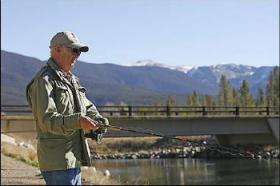Article contributed by Tonya Bina 11-07
Ray Osborn's father, Elonzo Osborn was also an avid fisherman and hunter, and he and a neighbor stocked cutthroat trout the in the 1920s in the lakes in what is now
Osborn's maternal great grandfather is Warren Gregg, a settler and talented carpenter whose wife took the life of her young children, sparing two boys, in a story that has become legend in
And Ray Osborn's father was a rancher, a man who was forced off of his land when a large water delivery system came to define the West Slope. Being fourth-generation
Osborn, who had six brothers and sisters, has seen two of his childhood homes be torn down "for progress." The first was the ranch house his family lived in before the Bureau of Reclamation claimed his father's 54 acres for the Colorado-Big Thompson project. The ranch land is now a lake bed, 11 feet below the water's surface.
When Shadow Mountain Reservoir was drained last year to kill weed growth, Osborn said he could still see the old foundation. The government offered his father $5,400 for the 54 acres, take it or leave it. "My father was broken-hearted over it because he loved to ranch."
With the money, Elonzo Osborn bought 11 acres on the north side of the North Fork of the Colorado, where he kept a milking cow and raised chickens, then went to work for the Bureau as a janitor at the government camps that sprung up for the construction of the project. Ray's mother went to work as a mail carrier, with a route from
During WWII, the family raised rabbits during a meat shortage. "Rabbits were easy to raise, and we sold a lot of them," Osborn said. Ray Osborn attended first through ninth grade at the
"On my first tour of duty, I came home on leave and went to a high school football game," Osborn said. It was there that Osborn met Mary Ann, who was visiting from
After a long-distance engagement, the couple married at St. Anne's Catholic Church in
Most of his career was spent overseas, Osborn said, with more than 16 years in
Upon retirement, after a stint in
Osborn likes how much fun they are to catch, and his youngest grandson does too.
"They're like wild trout - you got to know how to fish for them in order to catch them," he said. It's when the 75 year-old outdoorsman is talking about the rivers, inlets and hills he knows so well, he seems most at home. "Not too many people left here that have been here longer," he said.









